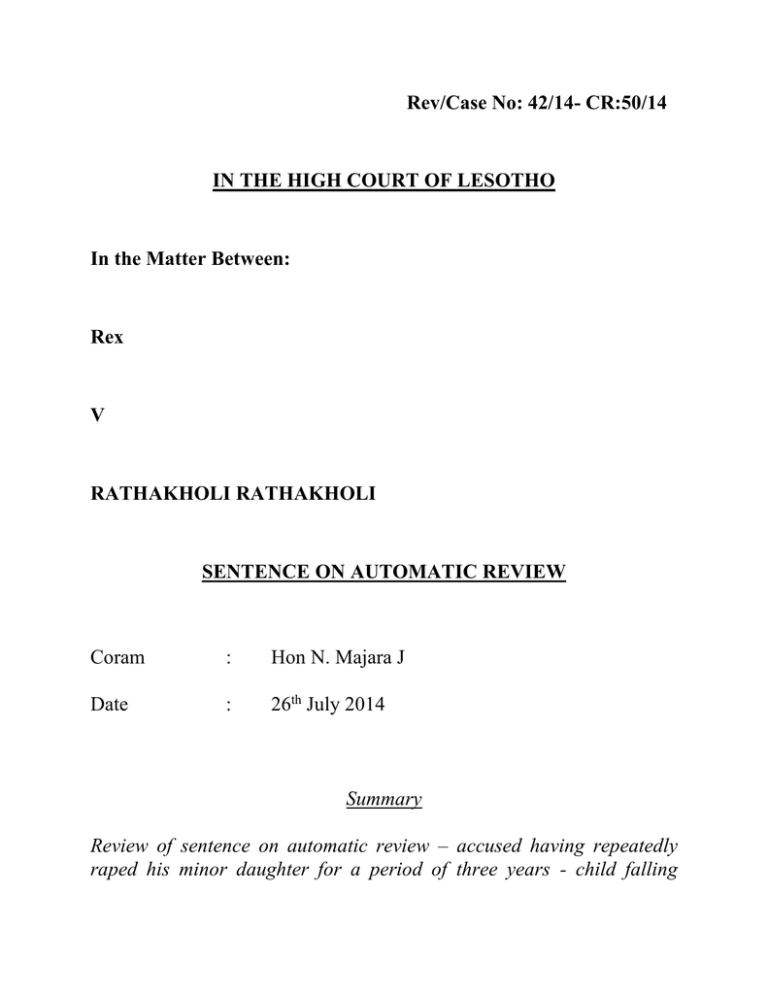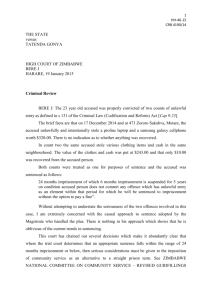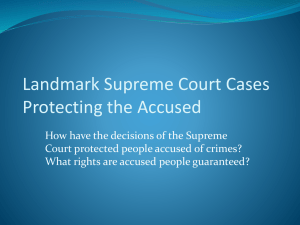
Rev/Case No: 42/14- CR:50/14
IN THE HIGH COURT OF LESOTHO
In the Matter Between:
Rex
V
RATHAKHOLI RATHAKHOLI
SENTENCE ON AUTOMATIC REVIEW
Coram
:
Hon N. Majara J
Date
:
26th July 2014
Summary
Review of sentence on automatic review – accused having repeatedly
raped his minor daughter for a period of three years - child falling
pregnant – accused given prescribed minimum sentence of 10 years
imprisonment – court a quo not stating factors it took into consideration
- relevant factors to take into account - the nature and seriousness of
the criminal act itself – the interest of society - relevant personal and
other circumstances relating to the offender which could have a bearing
on the seriousness of the offence - the culpability of the offender –
sentence altered to 20 years imprisonment.
ANNOTATIONS
STATUTES
1. Sexual Offences Act No.3 of 2003
CASES
1. S v Vilakazi 2009 (1) SACR 552 (SCA)
2. S v Malaga 2001 (1) SACR 469 (SCA)
3. R v Leteba CRI/S/001/2013
4. R v S Masitha CRI/526/2013
[1]
This matter came before me on automatic review after the accused
was convicted of rape it having been alleged that he had unlawful sexual
intercourse with his 17 year old daughter resulting in her falling
pregnant. The accused pleaded guilty to the charge admitted the
evidence outlined by the prosecution.
[2]
The brief facts are that after the accused’s wife passed away in
2010 the complainant who was 14 years old at that time, developed
nightmares and epilepsy which caused her to be fearful at night. As a
result she requested her father the accused, to let her sleep with him as
they lived in a single roomed house. It is only then that she would
manage to sleep peacefully without the nightmares.
[3]
During one night she woke up to find her father caressing her in an
unusual manner.
He then pulled down her panties and had sexual
intercourse with her. He threatened her not to tell anyone about the
incident.
The accused did this on several occasions and after the
complainant stopped going to his bed, he would go to where she was
sleeping and have sexual intercourse with her. PW1 did not tell anyone
as she was afraid of her father. This took place from the year 2010 to
2014.
[4]
During the month of February 2014 a neighbor met the
complainant and noticed that she was pregnant. She called her to her
house and examined her. Upon realizing that she was indeed pregnant
the neighbor asked her who was responsible and the complainant told
her it was the accused. The neighbor went to report the matter to the
headman who in turn called the accused and asked him about the
pregnancy.
The accused admitted that he had been having sexual
intercourse with his daughter. The headman then handed the accused
over to the police.
[5]
The accused admitted the facts that were outlined by the
prosecution and in mitigation of sentence he expressed remorse and
sought the Court’s leniency on the ground that he is the sole bread
winner for all his kids.
[6]
The trial Court sentenced him to imprisonment for ten (10) years
without the option of a fine, the minimum prescribed in the Sexual
Offences Act.1 In handing down the sentence, the Court a quo did not
state which factors it took into consideration in terms of what appears on
the record of proceedings in that having recorded the plea in mitigation
it simply ordered as follows:Sentence : 10 years, no fine.
[7]
It is against this background that this Court feels duty bound to
evaluate whether the sentence that was handed down is just given the
particular facts of this case. In doing so, I am largely guided by the
principles that were espoused in the by the Supreme Court of Appeal in
the South African case of S v Vilakazi
2
which have been consistently
applied in our jurisdiction.
[8]
In that case, although the Court was dealing with the issue of the
severity of the sentence that was imposed, the same principles apply
mutatis mutandis where the sentence imposed is found to be too lenient
1
2
Act No. 3 of 2003
2009 (1) SACR 552 (SCA)
given the relevant circumstances. Thus in Vilakazi (supra), in quoting
with approval the relevant parts of the remarks that were enunciated in
the earlier case of R v Malgas3, Nugent JA stated as follows:“…it is incumbent upon a court in every case, before it
imposes a prescribed sentence, to assess, upon a
consideration of all the circumstances of the particular case,
whether the prescribed sentence is indeed proportionate to
the particular offence. The Constitutional Court made it
clear that what is meant by the “offence” in that context (and
that is the sense in which I will use the term throughout this
judgment unless the context indicates otherwise)
“consists of all factors relevant to the nature and
seriousness of the criminal act itself, as well as all relevant
personal and other circumstances relating to the offender
which could have a bearing on the seriousness of the offence
and the culpability of the offender.”
…That was also made clear in Malgas, which said that
the relevant provision in the Act vests the sentencing court
with the power, indeed the obligation, to consider whether
the particular circumstances of the case require a different
sentence to be imposed. And a different sentence must be
imposed if the court is satisfied that substantial and
compelling circumstances exist which “justify” … it….
On each one of the grounds that I have referred to the
court below materially misdirected itself and the sentence
that it imposed cannot stand, which means that we must
ourselves evaluate whether life imprisonment is indeed a
proportionate sentence, in accordance with the approach
that was laid sown in Malgas.
If the sentencing court on consideration of the
circumstances of the particular case is satisfied that they
3
2001 (1) SACR 469 (SCA)
render the prescribed sentence unjust in that it would be
disproportionate to the crime, the criminal and the needs of
society, so that an injustice would be done in imposing that
sentence it is entitled to impose a lesser sentence.’
[9]
Coming back to the present case, I have already shown that the
accused herein had unlawful sexual intercourse with his daughter since
she was a at a very tender age of 14 years until he impregnated her three
years later. It is my view that his actions were not only heinous but they
bore very unfortunate fruits of bringing into this world a child born of an
incestuous, abusive, shameful and criminal conduct. Thus his actions do
not only have a bearing on his daughter but on the unborn child as well.
[10] Society and the Courts have decried the high incidence of sexual
abuse especially on young vulnerable children who in recent times are
more often that not abused by their fathers, brother, uncles, family
friends or someone they look up to for protection.
[11] Thus, as I stated in a similar case of R v Leteba 4, these type of
actions have devastating effects on the young children who make up the
highest percentage of victim of sexual offending. In this regard I further
stated as follows:“It is also quite disturbing that the accused herein is a
relative of the very young child. As it has repeatedly been
stated in previous similar cases, the child looked up to him as
4
CRI/S/001/2013 (unreported)
a protector rather than the villain. It is indeed a sad fact that
instead of diminishing, this phenomenon is gaining
momentum and has become so wide spread that it now forms
part of the daily news reports not only in Lesotho but in other
countries as well. It is a grave cause for serious concern and
certainly needs to be discouraged at all costs. One way is by
the Courts marking their displeasure by imposing serious
punishments that properly reflect the gravity thereof.”
[12] I have already shown that the court a quo meted out the prescribed
minimum sentence of 10 years imprisonment. However, in the light of
the principles that I have referred to above and the compelling
circumstances of this case, it is my view that the prescribed sentence is
disproportionate to the crime committed in this case which took place
for lengthy period, resulting in the young girl falling pregnant. It does
necessitate this Court’s intervention.
[13] Further, the courts have prescribed much higher sentences in
similar cases and it is only fair that there should be some form of
uniformity in all. For example, in another case that was brought before
me for review at the same time as the present one, to wit, R v Sebeso
Masitha CRI/526/13, the accused was sentenced to imprisonment for a
period of fifteen years yet his offence was of a lesser degree than the
present one by way of comparison.
[14] It is also worthy to note that in the Leteba case, (supra) I
sentenced the accused to imprisonment for a period of twenty (20) years
without the option of a fine after he was convicted for a similar offence
in that he had had unlawful sexual intercourse with a young girl of seven
(7) years on two occasions who was also a relative of his.
[15] In casu, the offence was done repeatedly, and it ended in very
unpalatable and devastating results. Considering all these factors, I am
of the opinion that this case justifies that I fetter with the sentence and
impose a higher one as it would be more appropriate in my view.
[16] On the basis of all these reasons, I order that the sentence of the
accused be set aside and be substituted with the following:
The accused is sentenced to a period of twenty (20) years imprisonment.
Accordingly, the court a quo is directed to immediately have the accused
brought before it to be informed of this alteration to his sentence.
N. MAJARA
JUDGE








